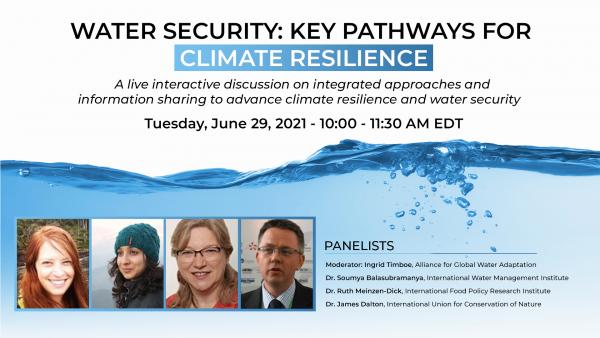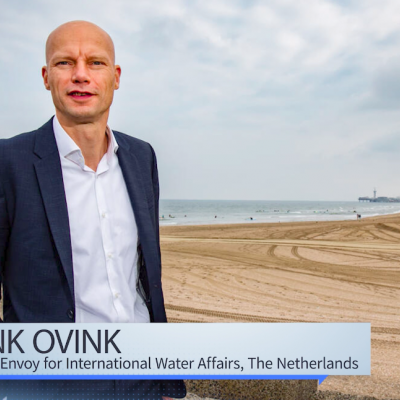How Water Security Is Critical To Climate Resilience
Involve Women And Young People To Bring New Perspectives, Says Panel
7 Jul 2021 by The Water Diplomat
Washington D.C, United States

"Why is it important for climate action to focus on water for adaptation and resilience?"
This was the opening question posed during a live panel discussion hosted in June by the US Department of State Bureau of Oceans and International Environmental and Scientific Affairs and the Bureau of Global Public Affairs.
The answers included an economist insisting that cost/benefit analysis is the wrong approach, a sociologist arguing the case for irrigation and an engineer delving into the human psyche.
Introduced by Julien Katchinoff, water team lead at the USDOS Office of Conservation and Water, and moderated by Ingrid Timboe, policy director at the Alliance for Global Water Adaptation (AGWA), the discussion was entitled Water Security: Key Pathways for Climate Resilience.
"Water is our ultimate blind spot when it comes to climate," said Dr. James Dalton, director of the global water programme at the International Union for the Conservation of Nature (IUCN), explaining that we worry about how we feed people and are good at sourcing alternatives through supply chain management, but that we find it difficult to connect and empathise with the challenges associated with water. He believes much of this lies in the human psyche and the fact that water is not fungible in the same way as carbon.
Dalton agreed with economist Dr. Soumya Balasubramanya's antipathy to cost-benefit analysis. The senior researcher at the International Water Management Institute (IWMI) stressed that the focus instead needs to be on equity, distribution and justice. "We need to think about very different ways, some of which we don't even know at the moment," she said.
Highlighting the importance of irrigation, the third panelist, sociologist Dr. Ruth Meinzen-Dick, a senior research fellow at the International Food Policy Research Institute (IFPRI) made the case for re-imagining irrigation strategies developed under previous rainfall regimes, to incorporate long-term sustainability, efficient renewable technologies and good infrastructure.
Find out more about the panel here
In a wide-ranging discussion that included audience questions, the panel gave examples of each of their organisations' efforts to make water central to adaptation and resilience, to share information and to seek integrated approaches to building water security.
The panel also touched on securing greater engagement from the private sector, on creating tailored approaches that support understanding and implementation at a local level, and on the role of young people in implementing positive change.
The webinar was the first in what is likely to be a series of similar events hosted by the USDOS as part of its commitment to re-engaging in a global leadership role on climate change.
Watch the full panel discussion here
Sharing their experiences, Balasubramanya and Meinzen-Dick stressed the role of gender in the successful rollout of initiatives at a community level, with disconnects often existing in how information is disseminated and received. "Extension services have a harder time reaching women," said Meinzen-Dick, adding that women often need different kinds of data and information than men when it comes to matters impacting water management and water quality.
Gender also arose in the discussion of the water sector itself, which Balasubramanya pointed out is very male dominated. "We need to bring in more women," she said, adding that the sector stands to benefit from "people who look at a problem in different ways."
Another group with the potential to bring a different perspective and new ideas to bear are youth, as pointed out by Dalton, who has extensive experience working in transboundary cooperation in Africa. He feels that some youth initiatives to date "haven't quite hit the nail on the head", and is worried that there are insufficient young people coming up through the ranks within agencies in Africa and Asia working on water-related topics. "We need to put youth in the driving seat of decision-making, work with them and mentor them," he said, adding: "We need to capture that energy."
- Climate Change
- Policy & Legislation
- Water Industry & Utilities
- United States Department of State
- International Water Management Institute
- International Union for the Conservation of Nature
- Alliance for Global Water Adaptation
- Ingrid Timboe
- Dr. Soumya Balasubramanya
- Dr. Ruth Meinzen-Dick
- Dr. James Dalton
- Julien Katchinoff
Related Topics

29 Apr 2021 Edinburgh, United Kingdom
Henk Ovink, Special Envoy for International Water Affairs of the Netherlands talks to us about his work, the Netherlands' unique approach to valuing water and the need for global c...
3 Feb 2021 THE HAGUE, Netherlands
Water challenges featuredon the agenda as one of the “action themes” at January'sClimate Adaptation Summit 2021, hosted virtually by the Netherlands, with more than 30 world leader...
